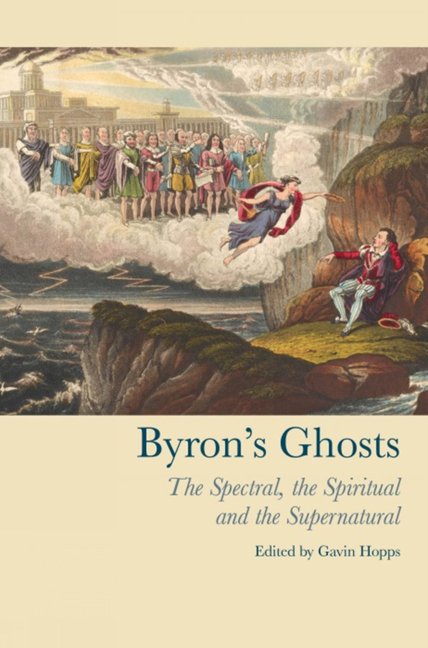Book contents
- Frontmatter
- Dedication
- Contents
- Acknowledgements
- Texts and Abbreviations
- Introduction: The Re-Enchantment of Romanticism
- Chapter 1 Determining Unknown Modes of Being: A Map of Byron's Ghosts and Spirits
- Chapter 2 Shades of Being: Byron and the Trespassing of Ontology
- Chapter 3 Byron and the Noonday Demons
- Chapter 4 Conjuration and Exorcism: Byron's Spectral Rhetoric
- Chapter 5 Byron avec Sade: Material and Spectral Violence in Childe Harold's Pilgrimage Canto IV
- Chapter 6 ‘’Twixt Life and Death’: Childe Harold's Pilgrimage, Don Juan and the Sublime
- Chapter 7 Byron, Ann Radcliffe and the Religious Implications of the Explained Supernatural in Don Juan
- Chapter 8 The Haunting of Don Juan
- Chapter 9 Being neither Here nor There: Byron and the Art of Flirtation
- Afterword: Blowing on a Dead Man's Embers: Byron's Biographical Ghosts
- Bibliography
- Notes on Contributors
- Index
Chapter 1 - Determining Unknown Modes of Being: A Map of Byron's Ghosts and Spirits
- Frontmatter
- Dedication
- Contents
- Acknowledgements
- Texts and Abbreviations
- Introduction: The Re-Enchantment of Romanticism
- Chapter 1 Determining Unknown Modes of Being: A Map of Byron's Ghosts and Spirits
- Chapter 2 Shades of Being: Byron and the Trespassing of Ontology
- Chapter 3 Byron and the Noonday Demons
- Chapter 4 Conjuration and Exorcism: Byron's Spectral Rhetoric
- Chapter 5 Byron avec Sade: Material and Spectral Violence in Childe Harold's Pilgrimage Canto IV
- Chapter 6 ‘’Twixt Life and Death’: Childe Harold's Pilgrimage, Don Juan and the Sublime
- Chapter 7 Byron, Ann Radcliffe and the Religious Implications of the Explained Supernatural in Don Juan
- Chapter 8 The Haunting of Don Juan
- Chapter 9 Being neither Here nor There: Byron and the Art of Flirtation
- Afterword: Blowing on a Dead Man's Embers: Byron's Biographical Ghosts
- Bibliography
- Notes on Contributors
- Index
Summary
It is fashionable, still, to press the case for discontinuities and indeterminacies of all kinds. Byron himself, with some plausibility, is often hailed as a harbinger of this view of all worlds and all words as shifting, merging, non-concluding. Ghosts and spirits, in this view of things, would most naturally be seen as liminal, the shadows and spectral traces through which language-bearing animals make their indeterminate way. it is certainly true that where Byron most explicitly talks about the business of ghosts – in cantos XV and XVI of Don Juan – a liminal context is immediately set up: ghosts are associated with ‘the horizon's verge’ (XV, 99), ‘the limits of the coast’ (XVI, 4) and with waterfalls and shade (XVI, 15).
Perhaps we may end up here, but it would not be a good place to begin, for Byron thought through categories, outlines and analogies as well as through processes and mergings. He dissolves but he also seeks out the contours of genres. Unlike Keats, he does not crowd intensities into a blurred but fecund centre; rather, he discriminates carefully between differing modes of being, even when they interact and change places. He thinks that some vast, apparently indefinable things can be mapped but others, more at hand, cannot. Ruined Rome, for instance, cannot be mapped according to Byron but, on the other hand, ‘The ocean hath his chart, the stars their map’ (CHP, IV, 81). I think that Byron's variegated poetry is more amenable to mapping than Ruined Rome. So it is both helpful and possible to try and establish a basic map or chart of Byron's habitual practices in representing ghosts and spirits, which will presume that distinctions exist as well as connections and that the two basic habits of mind assist one another.
For instance, Byron seems customarily to make a distinction between ghosts and spirits. Ghosts have been alive and are now dead. Spirits do not know death at all, for they live in some other sphere than mortals altogether, though some mortals claim to be essentially spirits.
- Type
- Chapter
- Information
- Byron's GhostsThe Spectral, the Spiritual and the Supernatural, pp. 30 - 47Publisher: Liverpool University PressPrint publication year: 2013



